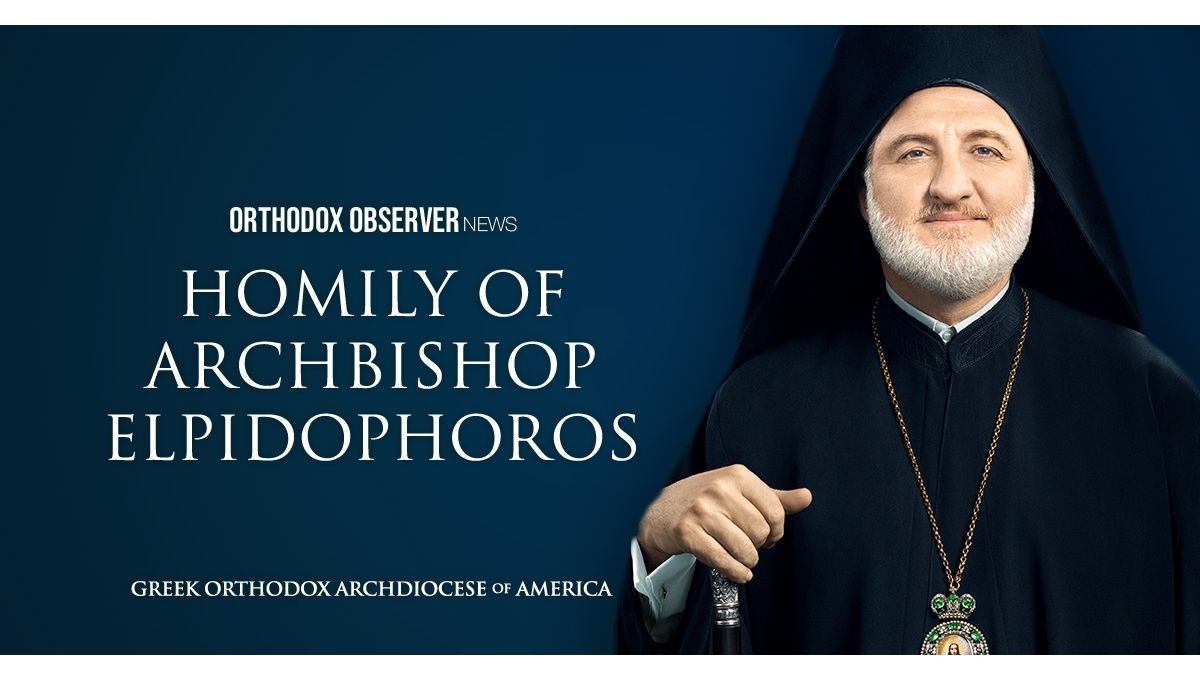His Eminence Archbishop Elpidophoros
Homily on the Fourth Sunday of Lent
March 26, 2023
Saint John the Forerunner and Baptist Orthodox Cathedral
Brooklyn, New York
Beloved Clergy of the Cathedral,
Dear Brothers and Sisters in Christ,
Today, I am very pleased to be with this wonderful community of the Slavic Orthodox Vicariate in America. We have arrived at the Fourth Sunday of the Holy Fast, when we remember the famed Abbot of Sinai, Saint John Climacus.
Here is a man – a teacher, a struggler of the desert – who was relatively unknown in his own lifetime. He wrote a book, filled with his precious sayings and teachings, for a very limited audience. In fact, it was at the request of the Abbott of Raïtho, another monastery in the Sinai Peninsula, that Saint John composed his text. Perhaps less than a hundred monks were the first to hear his words.
Yet, today, around the Orthodox Christian world, this book, called, The Ladder of Divine Ascent, is read in every monastery throughout the holy Forty Days of Lent. And even more remarkable, in the Orthodox Lands of the Nineteenth Century, the only book that was printed more than The Ladder, was the Holy Bible.
My beloved Christians: The Ladder of Divine Ascent that we celebrate today, in the person of Saint John Climacus, is much more than the book of the same name. It is a spiritual principle by which we all rise through spiritual steps.
It is an image of the Holy Virgin Herself, because she is the Ladder by which God descended from Heaven to save the world, as we hear in the prophetic readings for the Feast of the Annunciation.* And it is also how the Lord Jesus Christ described Himself, when He said to His new Disciples:
“Amen, amen, I say to you. From this moment on, you will behold the sky opening wide, and the angels of God ascending and descending upon the Son of Man.” †
The Divine Ladder is comprised of our shared human nature, but a humanity that is purified and cleansed from sin. In the Virgin’s case, her sinlessness is a result of her submission to God’s will, and to her unstained way of life, both before and after her Annunciation by the Archangel Gabriel. In the Lord’s case, we behold Him as sinless, though He faced every human temptation and every trial that can come against a person. And He faced every human weakness. As the Letter to Hebrews states:
“For we do not have a High Priest who cannot be touched with the feeling of our infirmities; but He was in all points tempted like as we are, yet without sin.”‡
Therefore, my beloved friends, we see that our ladder of ascent to God is the very human existence with which our Creator has endowed us. And every time that we choose the good – that we make a conscious choice to love instead of hate, to give instead of deny, to forgive instead holding resentment – these are the steps that lift us up.
Think about the very nature of a ladder. You cannot climb a ladder in a single step. You cannot jump from the bottom to the top in a single leap. You must carefully go step by step, because it is possible to fall the entire length of a ladder in a single slip. That is what is shown in the icon of the Ladder of Divine Ascent. The higher you go, if you do not pay attention, the more danger there is, just as on a physical ladder.
The steps we take to rise are the conscious acts of decency and goodness, of faith and hope, and ultimately of humility and love that mirror the sinless lives of our Lord and His Holy Mother. Each step takes us closer to the blessings of everlasting life, and in truth, it takes us closer to one another. In healthy relationships based in love, which is the essence of our Orthodox Christian Faith.
May we all rise on the ladders that God has given to each of us – our precious human lives – to our full potential as Children of God. And may we help one another along the way, even as the Angels assist us, ascending and descending on the ladders of our lives to steady our journey, to catch us when we fall, and to guide us to the goal of eternal life in God.
Amen.
* Cf. Genesis 28:12.
† John 1:52.
‡ Hebrews 4:15.

